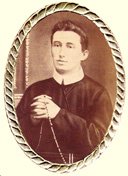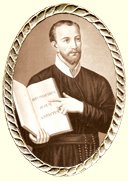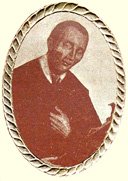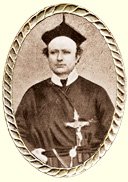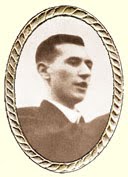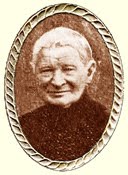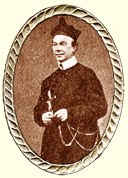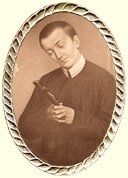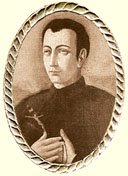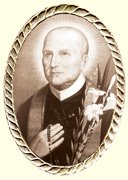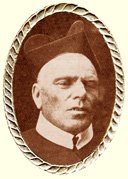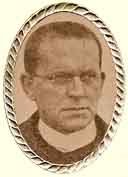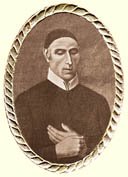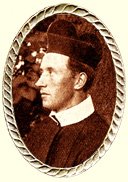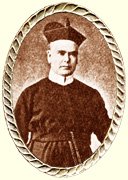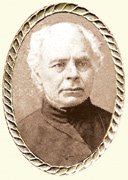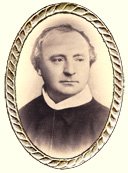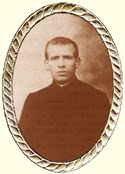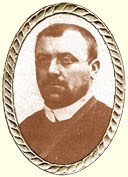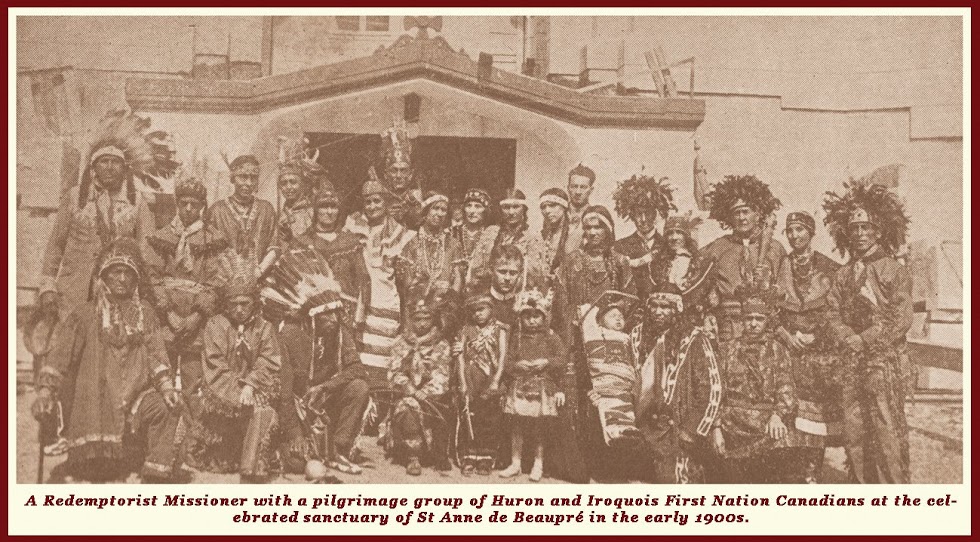The Servant of God Br Vitus Curzius, C.SS.R. (1716-1760)
First Redemptorist Coadjutor Brother
by St. Alphonsus De Liguori
He was born at Aquaviva, in the diocese of Bari, of most respectable parents, in the year 1716. One of his brothers was a medical man, and the other was a canon in the college of his native town.
In order to show the extent of God's goodness to this young man, we must mention that he was exceedingly passionate until he was twenty-six years of age. He was so alive to the least injury that he fought several duels in which he nearly lost his life. On one occasion amongst others, he felt so offended at a doctor, that he shot him. Another time he had the boldness to fire at a military officer; but God did not permit him to have the misfortune of hitting his mark.
After he left Procida, where he had been the treasurer of the Marquis of Vasto, he went to Naples and worked in the house of D. Caesar Sportelli, who was the Marquis's agent and his own intimate friend. Don Caesar had at this time resolved to leave the world which he soon afterwards did by entering the Congregation of the Most Holy Redeemer, where he died in the odour of sanctity. His tomb was opened four months after his death, when it was found that his body was quite flexible, and blood issued from an incision which was made in his foot.
Now one day when he was conversing with Vitus Curzius, he began to speak to him about the new congregation, which had been commenced at Scala under the title of that of the Most Holy Redeemer, through the pious exertions of Mgr. Falcoja, who was Father Caesar's director. Vitus had scarcely heard the particulars of it, ere he entreated to be admitted into it as a lay-brother, as he felt sure that God called him thither.
He had gained this certainty regarding his vocation to the new institute in the following manner: "In a dream," said he, "I saw a number of priests ascending a high mountain; I tried to follow them, but all my efforts were in vain; I fell backwards after each step, or if I succeeded in getting over a little ground, I soon lost all I had gained. Stupefied and discouraged at these repeated failures, I remained at the foot of the mountain in sorrow, when one of these priests came up to me, and held out his hand to me. By this assistance I was enabled to get to the summit as easily as the others had done." One day when he was out walking with Father Sportelli after this dream had occurred, he met one of the fathers of the congregation, and although he had never seen him before, he pointed him out to his companion, Father Sportelli, saying, "There is the priest who held out his hand to me."
He presented himself for approval and was accepted, but he was told to stay at Naples until the superior of Scala should send for him. He had indeed some time to wait, and this delay as to his definitive reception amongst us pained him greatly, and he longed and sighed for the hour of deliverance from this evil world.
One day, however, he went to Father Sportelli in a transport of joy, "for," said he, "I have heard a voice which said, 'Get ready to go, for you must soon set out.'" Indeed, the congregation had only been established eight days, when he was sent for to Scala, in November, 1732. The first day he arrived he was ordered to serve at dinner. As his greatest failing was a horror of humiliation, the devil represented to him that such an office was absurd and ignominious. "What," whispered the evil one, "are you to serve at dinner just as if you were a mere servant?"
This temptation beset him so much, that he felt inclined to be revenged on him who had ventured to give him such an office. However, as he saw that a man of rank who aspired to be received amongst us also, had the office of server, his good angel suggested to him, "Can you not do what he can do?" He thus conquered his repugnance and began to serve quite calmly.
From this time he became a special child of grace, and celestial consolations abounded in his heart. He was so enlightened during meditation, especially on the mysteries of the birth and passion of Christ, and his feelings were so sensibly affected, that he could not help bursting into tears, and sobbing to such a degree that it seemed as if the violence of his love for God would really suffocate him. This took place in a special manner when he received holy communion, which he did almost every day. I often witnessed this myself, and had to wait some time before he could receive the host. His tears and sighs also lasted for a good while after he had communicated. This plenitude of divine grace lasted for nearly a year.
As he had then made great progress in virtue, God deprived him of this sensible fervour that he might attain a more perfect kind of meditation, and imperceptibly brought him to a state of contemplation. He however himself began to fear that God had abandoned him. "What has come over me?" said he; "I cannot meditate. It is very true that I wish to be united with God, but if I had to give an account of what I have been thinking about I could not do it, and I should not even be able to tell how the time had been spent." Enlightened however by the graces conveyed in this the sublimest kind of prayer, he realised the vanity of labouring for any temporal possession, since all on earth is as smoke, which passeth away. He ceased to think of his home and of the friends of his youth, and only thought of how he might become closely united to his God.
He always kept his eyes cast down to the ground, and his very appearance showed the recollectedness of his soul. He became quite a model of humility and mortification, and he who had formerly been so susceptible and proud, and who had such an aversion to every menial office, did not now disdain publicly to carry the manure to the garden, or to draw water for the community.
This last office was by no means an easy one, for the well was at a distance from the house, and every time he went there he had to go up the steep mount of Scala with a heavy pitcher in his hand; yet when he arrived at our house he used to kneel down before the large crucifix at the entrance before he had deposited his burden, that he might offer up the fatigue it cost him to God. He always went thither with his head bare, in winter as well as in summer, through reverence for the presence of God, unless he was expressly forbidden to do so. He never went near a fire in winter. He was also for some time in the habit of taking off his shoes and stockings when he went to dig in the garden, and he used to stand working there with his feet buried in the clay; but when the superiors heard of it they forbade him to do so again.
One day, the bishop of Scala told him to empty out all the water in a large cistern near his palace. As there was a great quantity of water, his nature revolted at such a laborious undertaking, but he courageously pursued it to the end. He was heard repeating to himself, "You have made a great fuss, and you may be as tired as you please, but you must do it all the same, Brother Vitus." Another time he was ordered to help to saw some boards. As he had never done anything of the kind before, he was quite exhausted with this laborious office. After he had borne the greatest fatigue for two hours, the workman who was sawing with him said in a tone of extreme compassion, "Do rest for a little Brother Vitus." "No, no," he courageously replied, "we must finish what obedience has put before us." Another time, when he was cleaning out the dirtiest part of the house, a priest said in passing, "Bah! what an offensive smell there is here, Brother Vitus!" "O how much worse it smells in hell!," he replied.
It so happened that once for nearly a whole winter it was forgotten to give him any warm clothing, and he went about in his summer things without saying a word, although our house at Ciorani is so cold. All the time he was at Iliceto, where there is another of our houses, he slept on a board, with nothing but a trunk for a pillow. In order to mortify himself still more, he wanted to suck the sore of an old man, but he was forbidden to do it. He wore a sharp pointed iron girdle about two palms in length. He also took the discipline to blood with such frequency and violence, that he broke a nerve in his leg by it, from which he suffered for the rest of his life. His dinner often consisted in nothing but a little soup and bread, for he divided the different portions, and that was all he set aside for himself. As he was very inexperienced in all culinary matters at first, he one day made some unleavened bread, which soon became as hard as lead, and which it was impossible to set before the community. However, he had the patience to go on eating it day by day until it was all gone. He fasted on bread and water on Saturdays, in honour of our Blessed Mother Mary, and he did this even during mission time, although our coadjutor brothers have then to go through immense fatigue.
He never made excuses when reproved. One day our father-minister told him not to put so much fruit on the table, as he thought it superfluous. As Vitus had acted in obedience to the rector, he went on putting the same quantity. The minister was annoyed at this, and scolded him and gave him several mortifications for his disobedience, but he never said a word in extenuation of what he had done. At length the father-minister heard of the superior's wishes, and while he ceased to repove him, he admired his patience in bearing reprimands which he had never merited.
Another time when the superior could not find an important manuscript which one of our fathers had accidentally burnt, he asked Brother Vitus if he knew what had become of it, and he vaguely replied that it must have been burnt. As this answer gave cause to suspect that he was guilty of its destruction, he received a severe reproof, which he bore in patient silence, to shelter the father who really had destroyed it.
His love for his neighbour was truly admirable. As soon as he resolved to join us, he distributed all he had among the poor. His charity also towards the sick was inexpressibly great, and he not only exercised it towards the members of the congregation, but even towards strangers. The attention which Brother Vitus paid to a secular priest, who was taken ill in our house at Ciorani, proves the extent of his charity. This priest was suffering from a most offensive and troublesome malady, and it lasted for twenty days; yet Brother Vitus never left him night or day, and as he was too weak to move, Vitus had to lift him about and do everything he required. Holy Week occurred at this time, yet he cheerfully denied himself the gratification of assisting at the devotions of Holy Thursday, that he might not leave his dear invalid.
When he was at Scale he sometimes had to go to Amalfi to buy provisions for the use of the community. When he returned he was at liberty to get the porters to carry them up the mountain, for it was very steep, but if he saw that they were overcome by the weight of their burden and by the difficulty of the ascent, he would say, "Now you must rest, and I will help you." And he would take their loads from them, and carry them up the mountain himself, although they often weighed more than two hundred pounds.
One day, when one of the fathers of the congregation went to Scala, he heard of this extraordinary act of charity from two porters whom he met, who began to inquire of him about Brother Vitus. When he told them that he was no more, they sorrowfully exclaimed, "O what a saint Brother Vitus was! When he gave us goods to carry, he paid us for doing it, and then carried them himself." When he was at Scala, he felt such compassion for the sufferings of Father Sarnelli, who was ill at the time, that he took his own palliasse and added it to his, to try and make him more comfortable, although he was in consequence obliged to lie on the boards himself.
His favourite virtue was that of obedience, and in it consists the essence of religious life. He used to say that a coadjutor brother should resemble the bell which is fastened round the necks of cows, which never rings unless they move. "So a brother," he would add, "ought never to stir to do anything unless prompted to so by holy obedience."
Indeed he was, as it were, a martyr to this virtue; for while he was at our house at Iliceto, the superior sent him to a distant village to pass the night. The holy brother asked for admittance in a monastery in this neighbourhood but they refused to receive him. He was therefore obliged to sleep in the open air, and that in a most unhealthy place, and as the weather was also very unfavourable at the time, it brought on the illness of which he died. It came on so suddenly, and with such violence, that he was unable to return to St. Mary's and had to go to bed at the house of a charitable priest at the very entrance of Iliceto. He bore the sufferings of a tedious illness with admirable patience, and never complained of anything. He never objected to any remedy, and punctually obeyed the doctor's orders.
When he was near death, his confessor asked him whether he would rather live or die. "I only wish what God wishes," he replied, "but if I might make a choice, I should prefer to die, that I might be free from all danger of offending God, and that I might see Him and be with Him in heaven, if, as I trust, he in His mercy has vouchsafed me the grace of salvation." Before the holy viaticum was administered to him he asked if he would like to go to confession; but he answered that by God's grace he had nothing more to mention, and he died in a state of heavenly peace on Saturday the 18th September, 1745.
After his death the inhabitants of the place said to one another, "A saint is dead," and they were eager to have relics of him. The crowd which followed his corpse to our church showed the veneration of the faithful towards him. There are many more wonderful things which might be related of this holy brother, but I have not space to mention them. †





















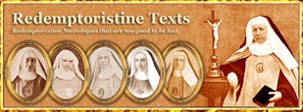
.jpg)









